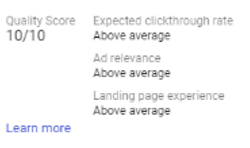Jay | 19 Jun 2018

There are a huge number of things to remember when managing your Google AdWords campaigns – but one of the most important things to consider is the Quality Score of your keywords.
 For those who do not know what Quality Score is – Quality Score is Google’s 1-10 rating given to each of your targeted keywords. There are three key components that make up your overall score, and for each of these components you can see a rating of “above average”, “average” and “below average” to better understand how your score is calculated. You can find your quality scores by hovering over each keyword’s status; a small window will show like the screenshot shown to the right.
For those who do not know what Quality Score is – Quality Score is Google’s 1-10 rating given to each of your targeted keywords. There are three key components that make up your overall score, and for each of these components you can see a rating of “above average”, “average” and “below average” to better understand how your score is calculated. You can find your quality scores by hovering over each keyword’s status; a small window will show like the screenshot shown to the right.
AdWords uses a combination of your Quality Score and your bid to calculate your position on the page. If they did not incorporate Quality Score into the calculation, companies could bid high to be at the top whilst possibly having irrelevant or low quality ads, so Quality Score helps both users and advertisers.
The three components of quality score are explained below, with some tips on what you can do to improve them…
Ad Relevance
The ad relevance refers to how relevant the ad text is to the targeted keywords. So if you are advertising a holiday cottage, and a Google user searches for the phrase ‘holiday cottage’, and you have the phrase ‘holiday cottage’ in your ad, this will help your Quality Score.
If you are struggling to improve your ad relevance, put yourself in the position of someone looking for your products or services when writing up your ads. What do you hope to find? Give the searcher a solution, within the character limits, that refers as closely as possible to the target keywords.
The implication of this is that you will probably need to write a lot of different ads to target different phrases!
Landing Page Experience
Running ads with a low Landing Page Experience score is another contributing factor to a poor overall Quality Score. As a customer, when making a search, you expect to be pointed in the right direction. So it is vital, as an advertiser, to do that for your potential customers. Otherwise, you will be paying for customers to visit your site just to be turned away due to landing on an irrelevant page which doesn’t suit what they are looking for.
For this particular exercise you will need to find the most relevant pages for each term; you may also want to create AdWords-only landing pages so you can properly tailor the ads to the landing page and vice versa. It is very important that if you are advertising something in your ad text you are also using the same kind of terminology on the landing page.
As well as worrying about the content on your landing pages, you also need to make sure that they load quickly, work well on mobile and so on, to make sure that the visitor experience is a positive one.
Expected Click-Through Rate
Your expected click-through rate predicts how likely it is that your ads will get clicked when shown for a particular keyword, not taking your current ad position into consideration. It takes into account your actual historical data, as well as the historical data for competitors advertising on the same term. If, for example, all advertisers that target a certain keyword always get a low click through rate, then your keyword will get a lower expected CTR, and you may find it always remains relatively low.
To improve your expected click-through rate you need to begin with improving your actual click-through rate. To do this, you need to ensure you are doing a few things. For example, running at least 2 ads at any one time, to test which kinds of messages get the best reaction from visitors. Also, make sure you include your target keyword in the ad, and have a strong call to action or a compelling deal to make people more likely to click on it. These are just a few things you can do – there are many more.
How Will a Poor Quality Score Affect Me?
Your Quality Score is used in AdWords to calculate your cost-per-click when your ads qualify to be shown for a targeted term. The lower the score you have on each keyword, the more you are likely to need to pay to reach the higher positions on Google.
If you have a competitor who is running ads for the same term and their keywords have a significantly better Quality Score than yours, not only will they have to pay less to reach a better position than you, but your AdWords budget will be used up faster, as you will be paying more for each click and so will get fewer clicks out of your budget.
All in all, over time, improving the Quality Scores of your keywords will save you money, bring in more traffic and potentially more sales or enquiries for your business. It is well worth the extra investment of your time.
Tags:
More from Ascendancy
Always coffee in the mornings, then tea in the day. You can never go wrong with an Italian… until you have to pick whether you want pizza or pasta. But Italian is probably my favourite. I would…
For e-commerce stores, a shopping feed provides a revolutionary way to advertise your product catalogue online. Despite removing the limits of a physical storefront and enabling you to list thousands…
Six months ago I started a Digital Marketing Assistant Apprenticeship, here at Ascendancy. To say that the time has flown by, would be an understatement! Although it is now hard to imagine life…
